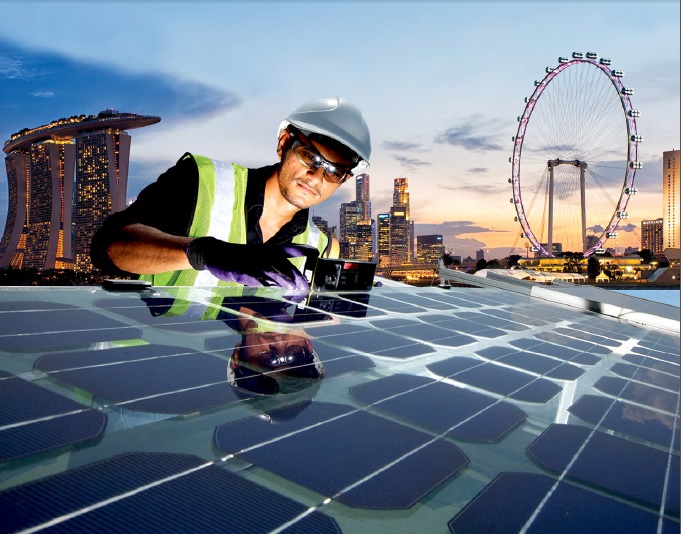
The Solar Energy Research Institute of Singapore (SERIS) at the National University of Singapore (NUS) has set a new R&D goal to develop a commercially viable thin-film-on-silicon tandem solar cell with 30% conversion efficiencies.
SERIS researchers will collaborate with Nanyang Technological University (NTU) and Campus for Research Excellence and Technological Enterprise (CREATE) of NRF on both III-V and perovskite materials, while SERIS will develop optimized silicon bottom cells.
In 2012, SERIS developed the world’s first all-back-contact silicon solar cell with efficiencies of over 20% using low-cost screen-printed metallisation. The technology was later transferred to pilot production at an industrial partner.
Try Premium for just $1
- Full premium access for the first month at only $1
- Converts to an annual rate after 30 days unless cancelled
- Cancel anytime during the trial period
Premium Benefits
- Expert industry analysis and interviews
- Digital access to PV Tech Power journal
- Exclusive event discounts
Or get the full Premium subscription right away
Or continue reading this article for free
Recently in 2017, the R&D centre commercialised and licensed an advanced tool design and layer formation method – called “monoPoly technology” – for silicon solar cells with passivated contacts and produced the world’s first full-size bifacial module with IBC (interdigitated back contact) solar cells.
Floating solar development
In the downstream solar sector, SERIS noted that it would develop a multi-purpose floating solar (FPV) system that would be suitable for off-shore applications in sheltered waters like Singapore.
SERIS is already working closely with Singapore’s Public Utilities Board (PUB) and operates the world’s largest testbed for floating PV in Singapore, comparatively testing and evaluating 10 different floating PV installations from around the world.
SERIS noted in its 2017 annual report that preliminary results from the 1MW FPV testbed that it was generating more electricity per year than a corresponding rooftop PV system, due to the cooling effect of the reservoir.
In October 2017, the institute had also organised the first floating solar conference globally at the 2017 Asia Clean Energy Summit.
Light-weight BIPV
SERIS is also initiating R&D efforts to develop low-cost, high-efficiency building-integrated PV (BIPV) modules and systems, including facades to support adoption in cities. SERIS noted that it would be working on high-efficiency, light-weight solar technologies that are aesthetically pleasing and yet economically viable.
Professor Armin Aberle, Chief Executive Officer of SERIS, said, “Leveraging our world-class research capabilities and services, SERIS is fully committed to be an important player in the solarisation of Singapore and a trendsetter in the global solar energy sector. We will continue to work closely with our research and industry partners to develop novel solutions that can further improve the efficiency and cost-effectiveness of solar power systems. The ultimate goal is to provide affordable, reliable and secure solar power for our homes, offices and industries.”
SERIS is working closely with government agencies and the private sector to enable the SolarNova programme, which aims to install 350MWp of PV systems on Singapore government-owned buildings by 2020.
10th anniversary
In 2018, SERIS is celebrating its 10th anniversary and has grown to become one of the leading applied solar institutes with a staff of 220, including 139 scientists, engineers and technicians, 56 postgraduate research students, 25 technical infrastructure and administration personnel.
SERIS also noted that it had so far trained 110 PhD students, many of whom are now contributing to the solar energy sector and some have founded their own start-ups.






